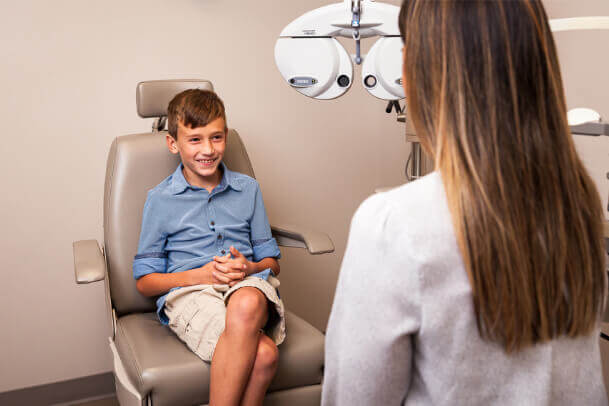Myopia Management
What Is Myopia?
Let’s chat about myopia, a common vision condition often referred to as nearsightedness. Imagine your child having clear vision up close but struggling a bit when it comes to seeing things at a distance. That’s myopia! It happens when the eyeball is a tad too long or the cornea is overly curved, causing light to focus in front of the retina instead of directly on it. The result? Blurry distance vision. No need to fret though—myopia is incredibly common, and we’ve got some fantastic solutions to make sure your kiddo sees the world with clarity and comfort.

Causes of Myopia
While there is a genetic component – if you or your partner are nearsighted, your child may be more susceptible – environmental factors also play a crucial role. Prolonged engagement in activities that require intense focus, such as extended screen time or reading, especially during the developmental years, can contribute to myopia.
Encouraging outdoor activities and ample exposure to natural light has been shown to have a protective effect. As we navigate the modern world, striking a balance between technology use and outdoor playtime becomes vital in maintaining your child’s visual well-being.
Risks Associated With Myopia
High myopia poses an increased risk of eye complications later in life, including cataracts, glaucoma, and retinal detachment. The more severe the myopia, the higher the likelihood of these complications. This is why it’s important to catch it in the early stages.
Additionally, myopia progression during childhood can impact your child’s academic performance and overall quality of life. However, the good news is that proactive measures can help manage and mitigate these risks.


Early Detection Is Key
It’s essential to keep a close eye on your child’s eye health. Regular comprehensive eye exams can help detect and manage myopia early on. If you notice your child squinting, holding books too close, or struggling to see the board at school, it’s a good time for a quick visit to our eye care professionals. We’re here to ensure your child’s eyes are in tip-top shape and ready for all the adventures that come their way!
Myopia Management Options
While myopia cannot be reversed, our goal is to keep it from getting worse, and we’ve got fantastic treatments to do just that. Our eye care professionals are here to guide you through the process, ensuring the best possible care for your child’s eye health. The following are treatment options that we may discuss with you based on your child’s unique needs.



